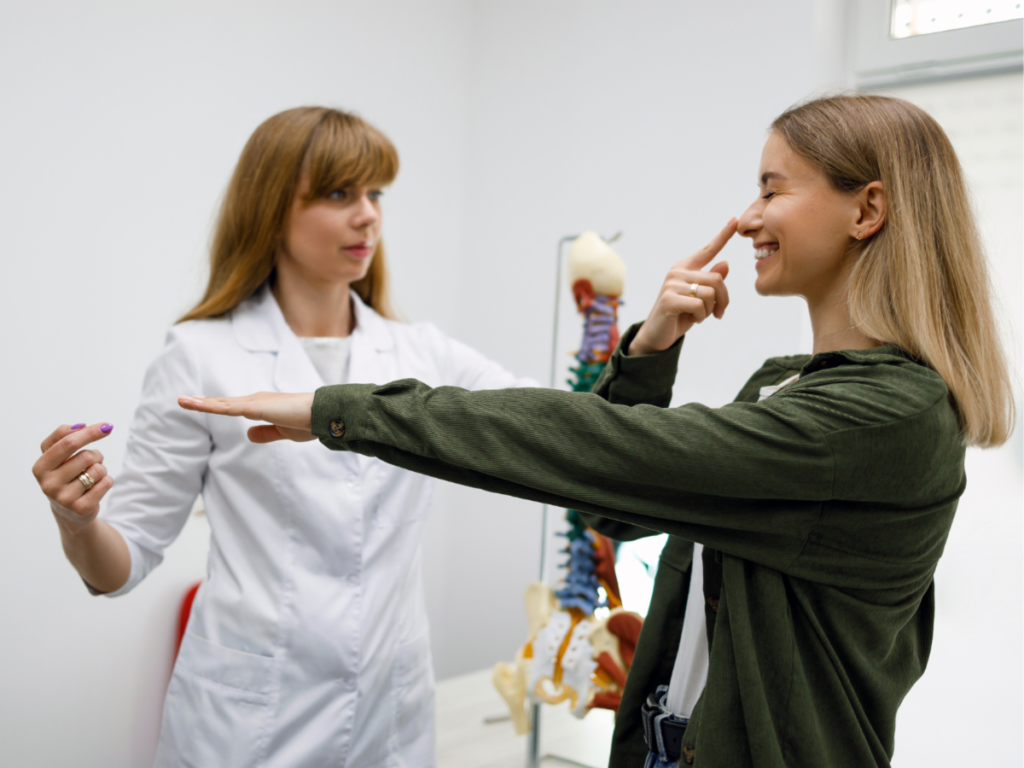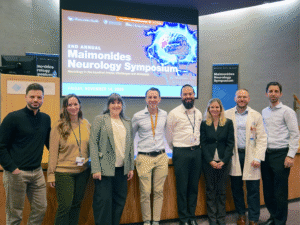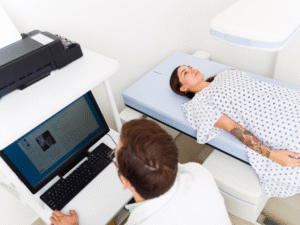Maimonides Health has announced its new Women’s Neurology Center, a comprehensive specialty neurology and OB/GYN care practice with a focus on women’s unique neurologic needs throughout their lifespan. The center is the first of its kind in the five boroughs—providing individualized neurologic care for women of all ages with a special focus on the most metabolically active periods in a woman’s life. Our expert teams of neurologists and women’s health care providers have established a care model informed by emerging knowledge of these key links to women’s neurologic and overall health.
Stroke and Neurological Conditions are Women’s Health Issues
One in five women will have a stroke at some point in their lifetime, and stroke is the third most prevalent cause of death of women in the United States1. Many providers are aware that stroke often presents differently in women compared to traditional signs and symptoms, but the neurologic differences between women and men go much deeper. Women generally face poorer outcomes after strokes2. Some women’s health conditions, like pregnancy, menopause (especially early menopause and certain menopause symptoms), preeclampsia, endometriosis, and migraine with aura, present an elevated risk for stroke. And aside from stroke, chronic neurologic conditions like multiple sclerosis and migraine are three to four times more common in women than in men3,4.
Within the medical community, women’s neurologic health is increasingly being considered as a unique women’s health issue, influencing the quality of care women receive for preventive care as well as acute and chronic condition treatment.
Led by Susanna O’Kula, MD, a Maimonides neurologist, and Rodney McLaren, MD, director of Maternal-Fetal Medicine Ambulatory Services, Maimonides’ Women’s Neurology Center aims to go beyond stroke recognition, identifying, addressing, and preventing conditions that put women at risk for stroke and adverse neurological events.
“It’s not a new field, but the unique factors influencing women’s neurologic health are becoming more widely recognized,” says Dr. McLaren.
“The impact of hormones like estrogen, progesterone, and testosterone on the female brain is very complex, and we’re just beginning to discover many of these relationships,” says Dr. O’Kula. “As we gain more and more knowledge in this area, we’re learning that there are many ways to optimize women’s neurological health across the lifespan. Additionally, many chronic neurological conditions like migraines, multiple sclerosis, epilepsy, and myasthenia gravis affect women longitudinally. So it’s very important for OB/GYNs and neurologists to approach these issues collaboratively and ensure that there are no gaps in care that can exacerbate these issues or leave them unaddressed.”
Expert Care for Every Patient and Concern
The Women’s Neurology Center is designed for all women with neurologic concerns, whether they have already been diagnosed or are looking for answers about concerning symptoms.
Most critically, specialists at the center cater to the needs of women during medically intense periods in their lives, like pregnancy and menopause.
“During pregnancy or menopause, latent neurologic conditions may be ‘unmasked,’ and existing conditions may be exacerbated,” says Dr. McLaren. “For women with existing neurological conditions, it’s especially important to engage in comprehensive care before these periods or as soon as they become apparent. For those who notice neurologic symptoms for the first time during these periods, rapid connection with a specialist can make a great difference in outcomes.”
For patients who are pregnant, or considering or planning pregnancy, Maimonides specialists offer preconception counseling, comprehensive prenatal care, and postpartum care. Neurologic diagnostic technologies include MRI, EEG, EMG, labs, and epilepsy gene panels.
In general, symptoms like changes in memory, mood changes, increased depression or anxiety, seizures, episodes where patients feel that they have inexplicably zoned out or lost time, and unilateral weakness or numbness could signal that patients require the attention of a specialist.
If patients are not yet seeing a neurologist with expertise in their condition, Women’s Neurology Center providers can help patients establish longitudinal care to monitor neurological health after pregnancy or the onset of menopause.
Conditions treated at the center include, but are not limited to:
- Epilepsy and seizure disorders
- Migraine and other headache syndromes
- Neurovascular diseases
- Multiple sclerosis
- Myasthenia gravis
- Genetic conditions
- Brain fog, memory issues, and Alzheimer’s disease
Deep Expertise in an Array of Specialty Areas
The center’s combined team of specialists elevates the quality of care delivered to patients, bringing multiple specialties together for ease of access.
The center’s neurology team has extensive subspecialty expertise in several areas, including neuroimmunology, neurovascular health, headache medicine, and neuromuscular health. On the women’s health side, specialists include OB/GYNs, maternal-fetal medicine specialists, obstetric and gynecologic surgeons, and menopausal health experts, as well as reproductive health social workers.
For additional concerns and comorbid conditions, patients benefit from the wide expertise in Maimonides’ specialty care network, including cardiovascular specialists, neurosurgeons, geriatricians, general surgeons, primary care providers, and physical and occupational therapists. Our collaborative approach means patients can get all the advanced care they need right in Brooklyn.
An Individualized Approach
As the center begins welcoming patients, Dr. O’Kula and Dr. McLaren emphasize their commitment to health equity in this woman-focused center for care.
“Historically, women’s concerns and pain have often been dismissed, particularly when we think about different ethnicities and socioeconomic strata,” says Dr. O’Kula. “Trying to improve equity in this dimension of healthcare, as we serve a diverse patient population, is central to our mission.”
To achieve this, the center’s priorities include helping patients address their concerns promptly, and guiding referring providers in helping their patients connect with this vital health resource.
“This is an incredibly dynamic center, and there is no one-size-fits-all approach when it comes to this kind of care, especially considering that this particular field of medicine is continuously growing and developing,” said Dr. McLaren.
Additionally, Dr. McLaren and Dr. O’Kula look forward to continuing Maimonides’ academic leadership in the fields of neurology and OB/GYN care. Seminars and conferences like the annual Brooklyn Stroke Symposium, Maimonides Neurology Symposium, and Maimonides Maternal and Neonatal Morbidity Reduction Symposium draw experts in their respective fields each year from across the United States and the globe. The Women’s Neurology Center team aspires to leverage its unique care model and expertise to further this approach to women’s neurologic health care, helping physicians, surgeons, care providers, trainees, and students stay on the cutting edge of this emerging discipline.
For more information or to refer a patient, call 718-283-7470 (Neurology) or 718-283-7979 (OB/GYN/Women’s Health).
References:
1: American Stroke Association. 2023. “Women Have a Higher Risk of Stroke.” Last modified October 2023. https://www.stroke.org/en/about-stroke/stroke-risk-factors/women-have-a-higher-risk-of-stroke.
2: Xu, Min, Adriana Amarilla Vallejo, Clara Cantalapiedra Calvete, Anthony Rudd, Charles Wolfe, Matthew D.L. O’Connell, and Abdel Douiri. “Stroke Outcomes in Women: A Population-Based Cohort Study.” Stroke AHA 53, no. 10 (2022). https://doi.org/10.1161/STROKEAHA.121.037829.
3: National Multiple Sclerosis Society. 2023. “Women with MS.” Last modified October 2023. https://www.nationalmssociety.org/understanding-ms/what-is-ms/who-gets-ms/women-with-ms.
4: Rossi MF, Tumminello A, Marconi M, Gualano MR, Santoro PE, Malorni W, Moscato U. Sex and gender differences in migraines: a narrative review. Neurol Sci. 2022 Sep;43(9):5729-5734. doi: 10.1007/s10072-022-06178-6. Epub 2022 Jun 8. PMID: 35676560; PMCID: PMC9176156.




